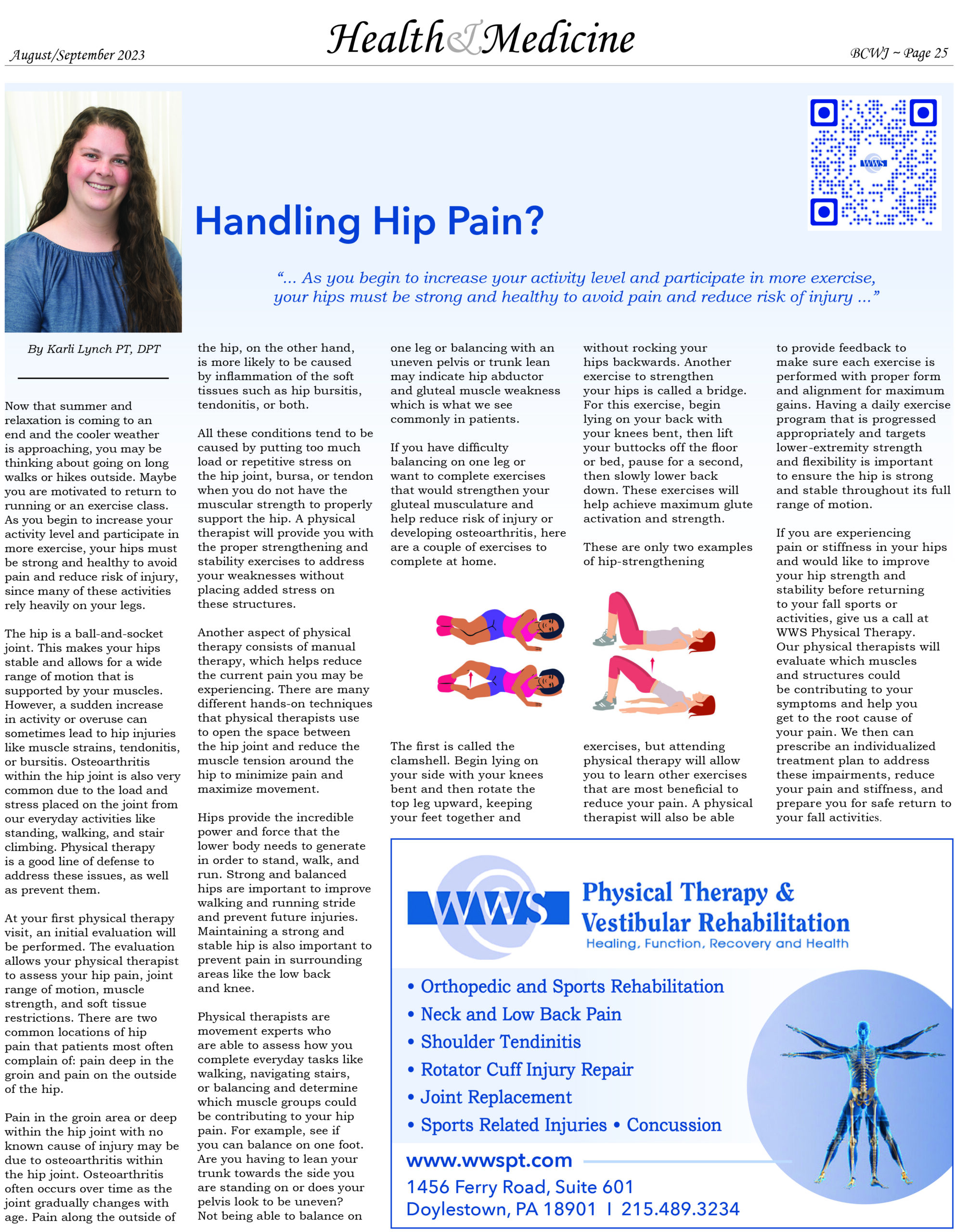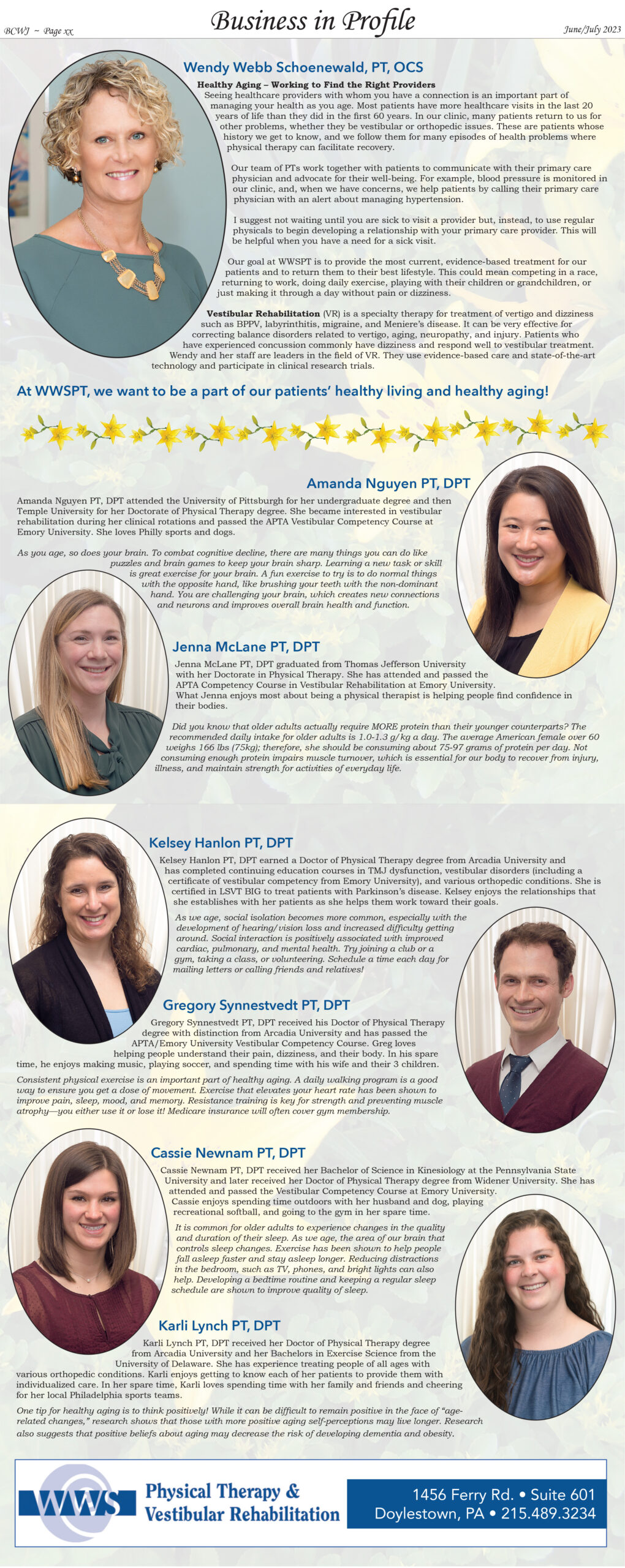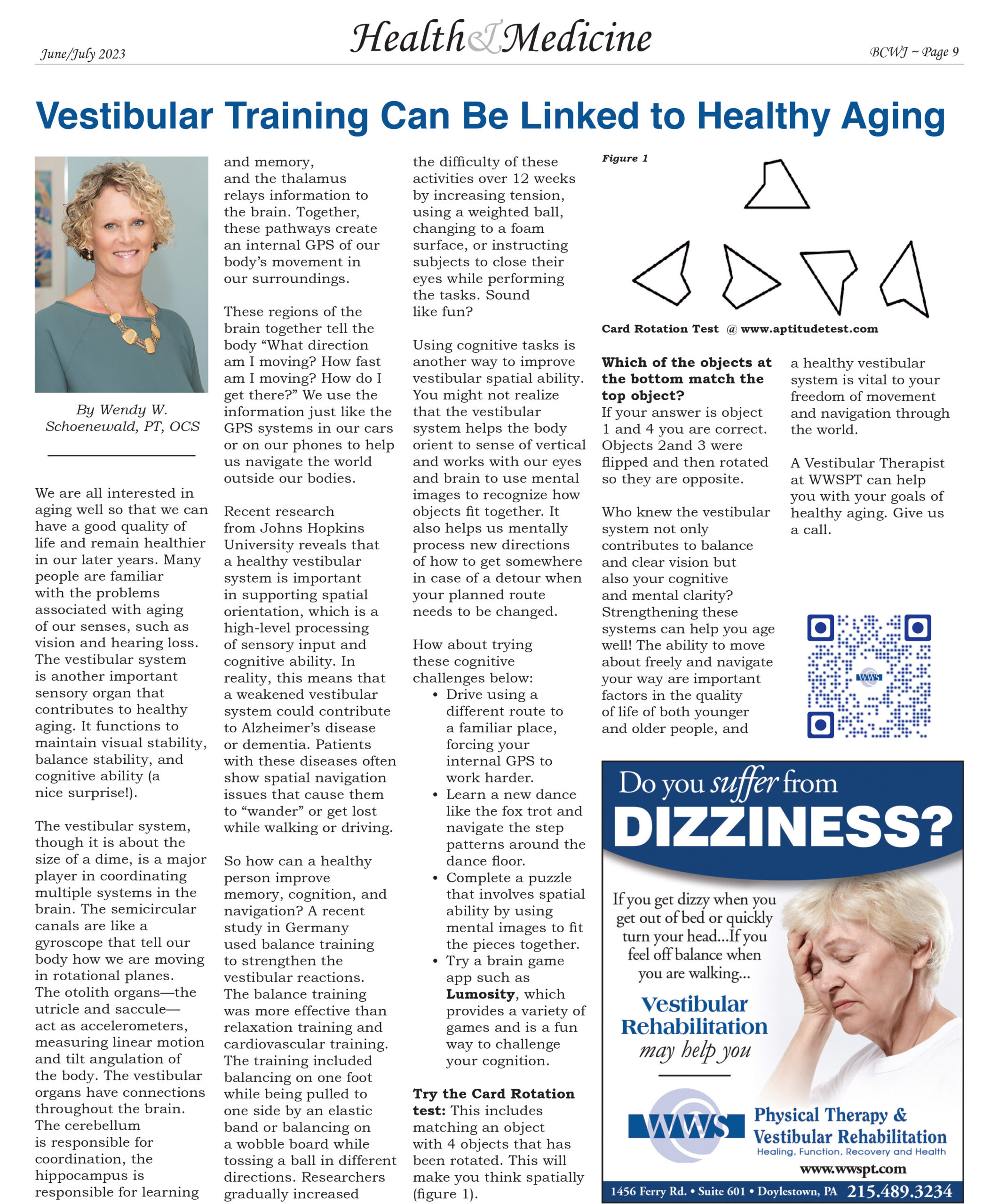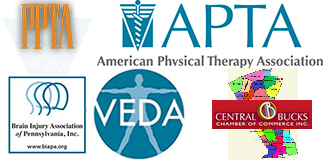Bucks County Women’s Journal (BCWJ) – WWSPT

Dr. Jenna McLane, PT, DPT, writes in her latest Bucks County Women’s Journal (BCWJ) article that the 24/7 accessibility of the Digital World has led to the new Aches and Pains of “Tech Neck” or “Text Neck.”
“One frequently reported problem in the WWS Physical Therapy clinic is neck pain associated with long hours on devices. “Tech Neck,” or “Text Neck,” as some call it, refers to the aching, soreness, and stiffness through the neck and upper back associated with prolonged time in front of a screen. But have no worries because Physical Therapy can help!”

Dr. Karli Lynch, PT, DPT, says it’s All About the Hips in the latest Bucks County Women’s Journal (BCWJ) article.
“As you increase your activity level and exercise more, your hips must be strong and healthy to avoid pan and reduce risk of injury, since many of these activities rely heavily on your legs.”

Check out Karli’s video on Handling Hip Pain.
June 1, 2023, The Bucks County Women’s Journal profiles the Staff at Wendy Webb Schoenewald Physical Therapy and Vestibular Rehabilitation, Doylestown, Bucks County, Pennsylvania.
Thank You, #BCWJ! We’re so excited about this article in the latest issue of The Bucks County Women’s Journal featuring Wendy Webb Schoenewald Physical Therapy and Vestibular Rehabilitation Staff! #WWSPT

Read more: Bucks county Women’s Journal
Check out the latest Bucks County Women’s Journal article written by Wendy Schoenewald PT, OCS, at WWS Physical Therapy and Vestibular Rehabilitation, Doylestown, Pennsylvania. Vestibular Training Can Be Linked to Healthy Aging

Wendy and our WWSPT Staff offer Healthy Aging Tips in the Bucks County Women’s Journal, (BCWJ), article June-July 2023
Wendy Webb Schoenewald, PT, OCS,
Healthy Aging – Working to Find the Right Providers
Seeing healthcare providers with whom you have a connection is an important part of managing your health as you age. Most patients have had more healthcare visits in the last 20 years of life than they did in the first 60 years. In our clinic, many patients return to us for other problems, whether they be vestibular or orthopedic issues. These are patients whose history we get to know, and we follow them for many episodes of health problems where physical therapy can facilitate recovery. Our team of PTs works together with patients to communicate with their primary care physician and advocate for their well-being. For example, blood pressure is monitored in our clinic, and, when we have concerns, we help patients by calling their primary care physician with an alert about managing hypertension. I suggest not waiting until you are sick to visit a provider but, instead, using regular physicals to begin developing a relationship with your primary care provider. This will be helpful when you have a need for a sick visit. Our goal at WWSPT is to provide the most current, evidence-based treatment for our patients and to return them to their best lifestyles. This could mean competing in a race, returning to work, doing daily exercise, playing with their children or grandchildren, or just making it through a day without pain or dizziness.
Vestibular Rehabilitation (VR) is a specialty therapy for the treatment of vertigo and dizziness such as BPPV, labyrinthitis, migraine, and Meniere’s disease. It can be very effective for correcting balance disorders related to vertigo, aging, neuropathy, and injury. Patients who have experienced concussions commonly have dizziness and respond well to vestibular treatment. Wendy Schoenewald and her WWSPT staff are leaders in the field of Vestibular Rehabilitation, (VR). They use evidence-based care and state-of-the-art technology and also participate in clinical research trials.
At WWSPT, we want to be a part of our patients’ healthy living and healthy aging.
Amanda Nguyen PT, DPT attended the University of Pittsburgh for her undergraduate degree and then Temple University for her Doctorate of Physical Therapy degree. She became interested in vestibular rehabilitation during her clinical rotations and passed the APTA Vestibular Competency course at Emory University. She loves Philly sports and dogs.
As you age, so does your brain. To combat cognitive decline, there are many things you can do like doing puzzles and brain games to keep your brain sharp. Learning a new task or skill is a great exercise for your brain. A fun exercise to try is to do normal things with the opposite hand, like brushing your teeth with the non-dominant hand. You are challenging your brain which creates new connections and neurons improving overall brain health and function.
Jenna McLane PT, DPT graduated from Thomas Jefferson University with her Doctorate in Physical Therapy. She has attended and passed the APTA Competency-Based Course in Vestibular Rehabilitation at Emory University. What Jenna enjoys most about being a physical therapist is helping people find confidence in their bodies.
Did you know that older adults actually require MORE protein than their younger counterparts? The recommended daily intake for older adults is 1.0-1.3 g/kg a day. The average American female over 60 weighs 166 pounds (75kg), therefore she should be consuming about 75-97 grams of protein per day. Not consuming enough protein impairs muscle to turn over which is essential for our body to recover from injury, and illness, and maintain strength for activities of everyday life.
Kelsey Hanlon PT, DPT earned a Doctor of Physical Therapy degree from Arcadia University and has completed continuing education courses in TMJ dysfunction, vestibular disorders (including a certificate of vestibular competency from Emory University), and various orthopedic conditions. She is certified in LSVT BIG to treat patients with Parkinson’s Disease. Kelsey enjoys the relationships that she establishes with her patients as she helps them work toward their goals.
As we age, social isolation becomes more common, especially with the development of hearing/ vision loss and increased difficulty getting around. Social interaction is positively associated with improved cardiac, pulmonary, and mental health. Try joining a club or a gym, taking a class, or volunteering. Schedule a time each day for mailing letters or calling friends and relatives!
Gregory Synnestvedt PT, DPT received his Doctor of Physical Therapy degree with distinction from Arcadia University and has passed the APTA/Emory University vestibular competency course. Greg loves helping people understand their pain, dizziness, and their body. In his spare time, he enjoys making music, playing soccer, and spending time with his wife and their 3 children.
Consistent physical exercise is an important part of healthy aging. A daily walking program is a good way to ensure you get a dose of movement. Exercise, where you elevate your heart rate, has been shown to improve pain, sleep, mood, and memory. Resistance training is key for strength and preventing muscle atrophy – you either use it or lose it! Medicare insurance will often cover gym membership.
Cassie Newman PT, DPT received her Bachelor of Science in Kinesiology at the Pennsylvania State University and later received her Doctor of Physical Therapy from Widener University. She has attended and passed the vestibular competency course at Emory University. Cassie enjoys spending time outdoors with her husband and dog, playing recreational softball, and going to the gym in her spare time.
It is common for older adults to experience changes in the quality and duration of their sleep. As we age, the area of our brain that controls sleep changes. Exercise has been shown to help people fall asleep faster and stay asleep longer. Reducing distractions in the bedroom, such as TV, phones, and bright lights can also help. Developing a bedtime routine and keeping a regular sleep schedule are shown to improve the quality of sleep.
Karli Lynch PT, DPT received her Doctor of Physical Therapy from Arcadia University and her Bachelors in Exercise Science from the University of Delaware. She has experience treating people of all ages with various orthopedic conditions. Karli enjoys getting to know each of her patients to provide them with individualized care. In her spare time, Karli loves spending time with her family and friends and cheering for her local Philadelphia sports teams.
One tip for healthy aging is to think positively! While it can be difficult to remain positive in the face of “age-related changes,” research shows that those with more positive aging self-perceptions may live longer. Research suggests that positive beliefs about aging may also decrease the risk of developing dementia and obesity.
Orthopedic Treatment
Physical Therapy is Crucial for Shoulder Health – By Amanda Nguyen (PT, DPT). Download PDF.
Vestibular Rehabilitation
Technological Advances in the Diagnosis of “Vertigo” – By Greg Snyyestvedt (PT, DPT). Download PDF.
Concussion
Navigating Concussion Recovery – By Jenna McLane (PT, DPT). Download PDF.
Parkinson’s Disease
WWSPT Parkinson’s Disease: Overview and Latest Research – By Kelsey Hanlon (PT, DPT). Download PDF.
Healthy Aging
Sleep – Another vital sign for good health – By Wendy Webb Schoenewald (PT, OCS). Download PDF.
Healthy Aging Tips
Healthy Aging Tips – WWSPT Staff – By Wendy Schoenewald & WWSPT Staff. Download PDF.
For additional WWS Physical Therapy and Vestibular Rehabilitation articles in the Bucks County Women’s Journal, BCWJ, click on the links below:
WWSPT Orthopedic Treatment articles in BCWJ
WWSPT Vestibular Rehabilitation articles in BCWJ
WWSPT Concussion articles in BCWJ
WWSPT Parkinson’s Disease articles in BCWJ
WWSPT Healthy Aging articles in BCWJ
